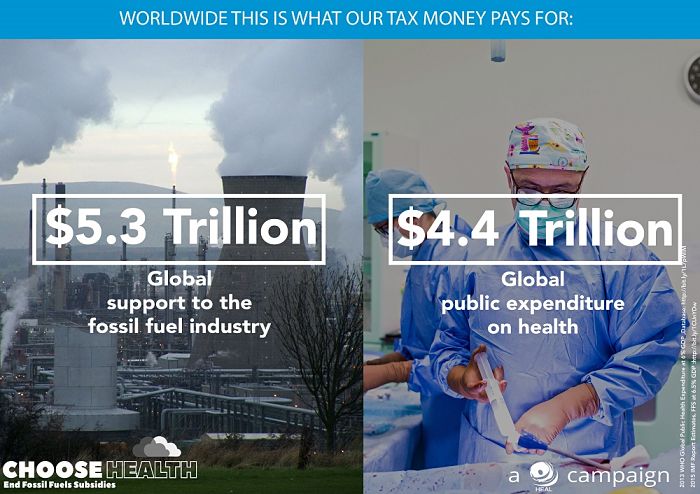HEAL welcomes the call from 250 scientists urging the European Commission to follow scientific recommendations and include provisions to account for the effects of chemical mixtures to better protect health in the upcoming revision of REACH, the EU’s regulation for chemicals.
Brussels, 6 February, 2017 – HEAL has launched its new campaign focused on health as a driver to accelerate the end of fossil fuel subsidies.
What is this campaign about?
Fossil fuel subsidies cause pollution, provoke premature deaths, spread disease and endanger the climate. HEAL’s new campaign, Choose Health – End Fossil Fuels Subsidies aims to shed light on the public health opportunity that a full phase out of fossil fuel subsidies and a subsequent end of the fossil fuels era would present.

For this purpose HEAL has launched:
- a campaign website that will allow interested people and institutions to sign up and stay informed about actions that demand #stopfundingfossils
- memes and other visuals displaying fossil fuel subsidy facts and figures to use on social media and share widely
- an updated version of our Fossil fuel subsidies & health briefing with some new insights
The campaign builds on the knowledge that fossil fuels such as coal largely contribute to greenhouse gas emissions, climate change and air pollution which harms health.
It aims to raise awareness especially among the health and medical community and to build momentum for the phase out of fossil fuels subsidies.
HEAL has a strong track record in bringing evidence and knowledge about climate change and health to the forefront of deliberations at EU and international level and is determined to use this expertise to help end the use of fossil fuel subsidies in the European region.
What do we want?
HEAL is calling on governments to stop providing public funds to one of the world’s most polluting industries and to make the full transition to renewables, protecting our health and preventing rapid climate change.

Background information:
Subsidies make fossil fuels such as coal cheaper, encouraging their use and increasing the harmful pollution toll to the environment and human health. Negative effects include premature death, heart and lung disease, respiratory problems such as asthma and harm to the vulnerable groups such as unborn babies and children.
These subsidies represent extremely high government support to coal, oil and gas, taking place in many countries worldwide. This support comes in the form of direct investments or tax exemptions to producers, but also by not incorporating the damage fossil fuels cause to the climate and our health in pricing decisions.
Besides them being harmful, subsidies are also expensive for governments and consequently for taxpayers, locking in funds that could be used for public infrastructure such as roads, schools and hospitals. The International Monetary Fund (IMF) recently estimated the “true costs” of government subsidies to the industry at $5.3 USD per year. This is more than the total health spending of all governments worldwide (2).
To support this campaign, HEAL will be working on the publication of the first ever report on fossil fuel subsidies and health, which will compare coal subsidies with public health spending and support for renewables in a set of target countries.
Contact:
Should you wish to find out more about the campaign, please contact Vijoleta Gordeljevic at vijoleta@env-health.org
Notes:
(2) IMF report HTTP://WWW.IMF.ORG/EXTERNAL/PUBS/CAT/LONGRES.ASPX?SK=42940.0
In 2007, HEAL published a briefing reviewing the latest scientific evidence on climate and health from the IPCC. This laid the basis for building policy recommendations, focusing on protecting the most vulnerable groups and considering win-win scenarios for public health through climate mitigation measures. HEAL works closely with the World Health Organization (WHO) and helped facilitate World Health Day on climate change in 2008. Since then, many medical groups, citizens and policy-makers have advocated for health at the centre of climate change mitigation. Public awareness was increased in 2010 with a ground-breaking HEAL – HCWH report on a 30% reduction target for EU climate policy. HEAL’s Unpaid Health Bill – How coal power plants make us sick marked the beginning of a coal and health campaign in 2013 in which HEAL works closely with medical, health and climate advocacy groups, especially in countries where coal is a particular threat to health. Since its successful launch at EU level, the Unpaid Health Bill has been launched in Germany, Poland, Romania, Turkey and the Western Balkans.
The Briefing on fossil fuel subsidies and health is also available in Turkish (English – Turkish).


